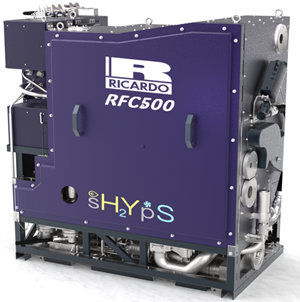News
Ricardo secures Lloyd’s Register approval in principle for innovative hydrogen solution for maritime
Ricardo, a global strategic, environmental, and engineering consulting company, has received Approval in Principle (AiP) from Lloyd's Register, the leading provider of classification and compliance services to the marine and offshore industries, for the design of its cutting-edge multi-megawatt containerized fuel cell power plant solution.
The technology has been designed and developed by Ricardo as part of the Sustainable Hydrogen Powered Shipping (sHYpS) project, for which the company is applying its world-leading expertise in the H2 value chain to implement innovative H2 technologies. Ricardo is the fuel cell system partner in the sHYpS project, which includes the specification, design, build and test of a ~500kW gross, 375-kW net power fuel cell module (RFC500) and the design of a 40-foot containerized multi-megawatt power plant that combines the outputs of several fuel cell modules. The granting of approval in principle by Lloyd’s Register signals confidence that this technology has the potential to satisfy regulatory requirements and can be used more widely as a solution to support future decarbonization across the maritime industry.
Ricardo is about to start testing the RFC500 module and is now assembling its marine containerization system in its new, purpose-built fuel cell facilities at its Shoreham Technical Centre in the UK.
Jason Oms O’Donnell, Managing Director of Automotive & Industrial at Ricardo said, “This represents a significant achievement in our progress to support our customers in the maritime industry with the technology to enable them to deliver on their decarbonization strategies. AiP offers us an opportunity to progress with a roadmap for full regulatory compliance of our containerized solution. It gives confidence for investment and signals that there are no major obstacles to future certification or classification."
“We are investing in our H2 capabilities, and in particular, we are seeing a lot of interest from customers in the maritime, aerospace, and off-highway sectors for the services that we provide. It’s an exciting time to be involved in supporting sustainable mobility, due to the significant changes that are taking place, based on regulatory and legislative requirements. We are very well placed to support our customers with their future decarbonization journey.”
This is the latest example of Ricardo’s capability in H2 technology supporting decarbonization in the maritime industry. On 7 May 2024 Ricardo announced the expansion of its H2 testing capabilities for global clients through investment in facilities at its Shoreham Technical Centre in the UK to develop testing of large-scale marine engines.


